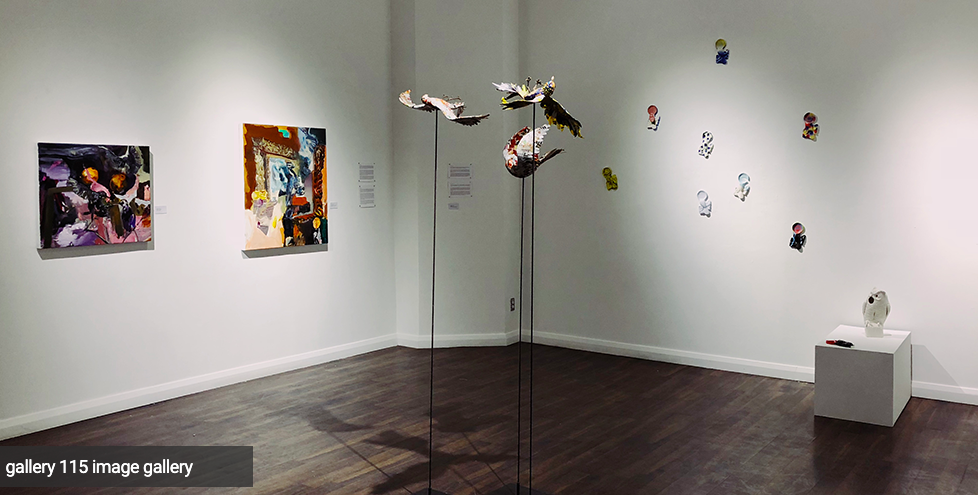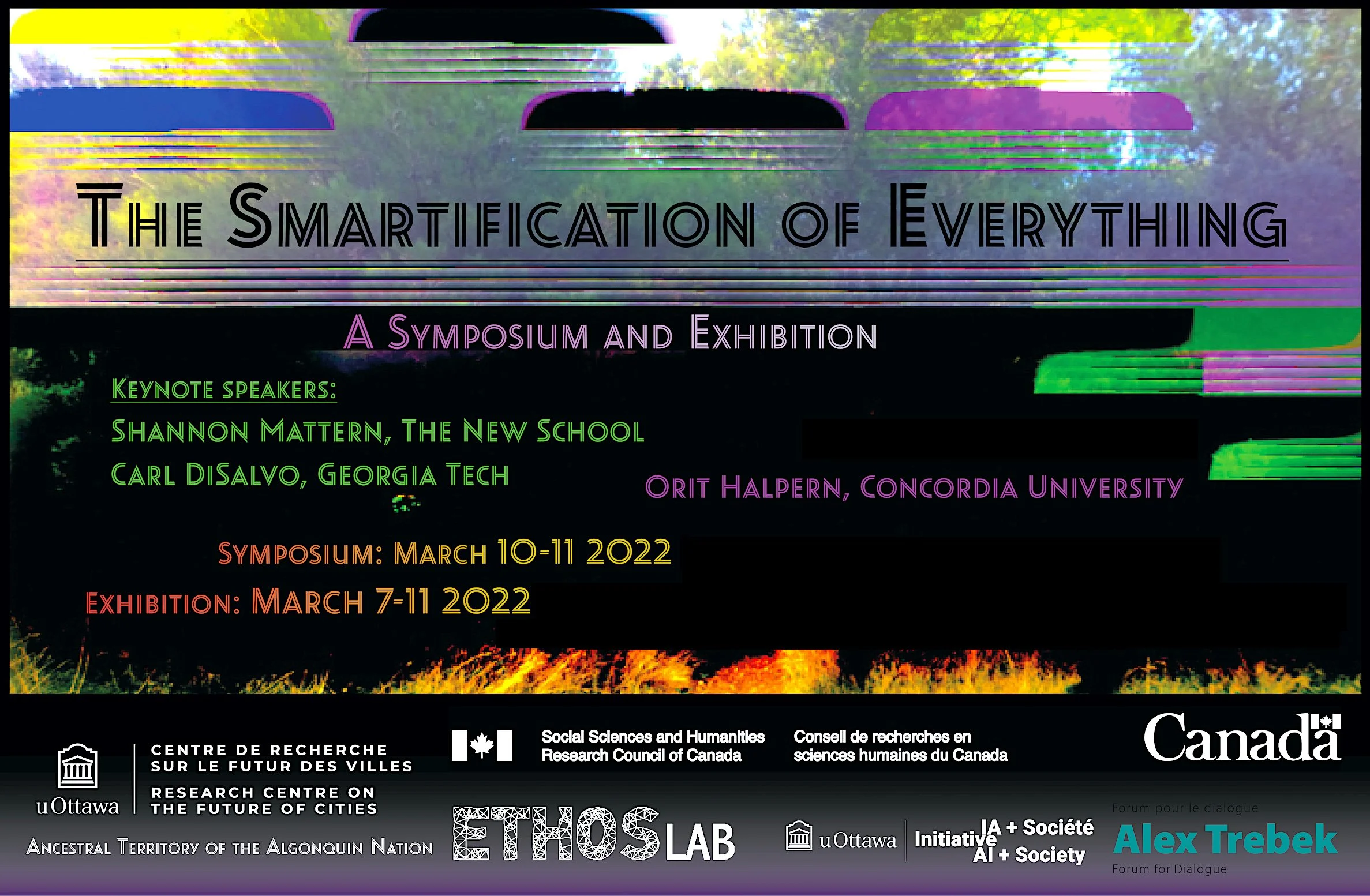The Smartification of Everything Symposium and Exhibition “smART”
Exhibition March 7-11, 2022, Exhibition Opening March 9, 2022, Symposium March 10-11, 2022
View images from the symposium event here

About the Event
With predictions that around the world population concentration will shift to cities, the urban space has attracted considerable interest among researchers, architects, artists, and more. Urban spaces are increasingly ‘smart,’ where application of digital technologies convert cities into (supposedly) self-learning systems, such as automated traffic control. While proponents highlight smartness approaches and digitalization as a resource-efficient way to live in and govern the city, it is not always evident whose interests are served, or what issues may arise in the long run. Yet cities are not the only ‘smart’ spaces, and this points to two more recent trends: a shift in attention to the rural, and a growing smartification of those spaces beyond the urban. Researchers turn to smart forests, smart oceans, or smart agriculture as sites of techno-social-environmental change. When corporations are busy collecting environmental data, what implications does this have for contemporary and future developments?
This symposium takes up these imbrications and diffusions, and seeks to put into dialogue scholars and artists to explore the social, political, cultural and environmental implications of the smartification of the city, the rural, and beyond. What can be learned from such cross-examinations both about the ‘smartified’ fields, and smartness itself? Through what other (smart?) media, art and interactive formats may we engage with these issues? The ‘Smartification of Everything’ is a hybrid event with an in-person and virtual component that consists of a symposium, an exhibition, and interactive events.
The symposium and exhibition are guided by the following provocations, which invite us to not only see connections between different fields – from the urban to the rural – but also between academic work and the arts:
How do ‘smart’ systems in the city differ from or relate to those applied to the forest, ocean, climate, or agriculture? Is this a mere story of technology diffusion from the urban to the non-urban, and if not, why and how?
What do processes of diffusion, adaptation and region- or local-specific forms of ‘smartness’ say about power relations? Do smart systems effectively challenge social and environmental inequalities, and what role does design play in these processes?
In cross-examining urban, oceanic, agricultural or climate settings, what can be learned about the very meaning of ‘smartness,’ and the specific digital technologies?
In what ways do such applications and systems norm smartness as technical property, and with what consequences? What happens to practices that are in contrast rendered ‘stupid’, and what may be the joy and refusal in such declared stupidity?
How do technology-smart systems reconfigure its object or sphere as in need of smart transformation; that is, how do smart systems render the city, agriculture, the ocean, the forest and environments technology-smart, thereby shaping epistemologies and ontologies?
What is an artificial ‘intelligence’ in the context of a smart city, forest, or ocean?
What Indigenous cosmogonies and alternative approaches, such as agroecological or forest-caring practices and principles, may be silenced as a result?
How does gender and race intersect with, or refuse smartness, and what does this say about the respective identities and properties?
What (raw) material and energy resources are required to set up smart systems? Contrasting them with such systems’ affordances for a seemingly more sustainable future, what is ‘smart’ about them?

smART Exhibition
The Smartification of Everything features the week-long exhibition “smART”, from March 7-11, at the gallery room 115, Department of Visual Arts (uOttawa).
Orit Halpern will be delivering a keynote speech on March 9, 5:30-6:30 pm for the opening of the exhibition.
You can also visit “smART” online through our virtual gallery! (coming soon)
Sponsored by and in collaboration with
Organizers
Science and Society Collective – SSC: As part of the Canadian Research Chair in Science and Society, the Science and Society Collective approaches science and society as necessarily connected. In their research work, the members of SSC highlight the interplay between values, norms, politics and technology and the positive and negative effects of this socio-technical feedback. To learn more, see http://scienceandsocietycollective.com/
Research Centre for the Future of Cities – RCFC: The Centre offers a unique Canadian research environment that aims to address the major challenges of the 21st century by addressing the relationship between urban transformation, the climate and social crisis, and the Anthropocene. In that perspective, we are developing tools for the analysis and interpretation of urban social, cultural and economic issues from an interdisciplinary perspective to move beyond the models inherited from the 20th century. To do so, we examine in a multi-situated and multimodal perspective the evolution of lifestyles and urban spaces and issues related to the future of cities and we propose new perspectives on the urban processes and the Anthropocene in order to problematize the contemporary. To learn more, see https://www.uottawa.ca/future-cities/
ETHOS Lab is a critical feminist methods laboratory at the IT University of Copenhagen, Denmark, dedicated to experimentation at the intersection of digital methods, ethnographic inquiry, and speculative fabulation. We take seriously the Harawayian notion that methods make worlds. Creativity with methods is essential part of our work as investigators of technological worlds and the ways we hope to reshape them. We draw upon an interdisciplinary cross-pollination of the fields of STS, Anthropology, and Human Computer Interaction. We aim to understand how digital and computational methods migrate into humanistic and organizational understandings of social relations. And we experiment with how technologies can extend our modes of inquiry by engaging critically with their worldmaking capacities To learn more, see https://ethos.itu.dk/
Alex Trebek Forum for Dialogue (Project on AI for Healthy Humans and Environments at the University of Ottawa AI + Society Initiative): The Forum for Dialogue hosts conferences, workshops and other public events related to research projects on major public policy challenges and invites heads of government to deliver lectures and speeches. A forum to enrich and broaden public debate in Canada, the Alex Trebek Forum for Dialogue has most recently supported 12 uOttawa Centres and Institutes to examine public policy and drive change on issues of critical significance to all global citizens, including how to build inclusive and durable democracies, protect privacy and the rights of citizens as the role of AI and big data expands in medicine and food production, and protect water resources in the era of rapid climate change. To learn more, see https://www2.uottawa.ca/research-innovation/forum-for-dialogue






